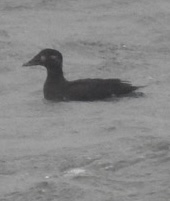Surf Scoter: Second Arran Record
Reports



Surf Scoter is one of the family of black sea ducks called scoters. The Surf Scoter is a North American species breeding in the sub-arctic from western Alaska east into northern Canada and wintering along both the Pacific and Atlantic coasts of North America with some on the Great Lakes. It is a vagrant on this side of the Atlantic with the first British record in the Firth of Forth in 1837. The British Trust for Ornithology (BTO) indicates that there are around fifteen records a year in the UK, mostly in the north and east of Scotland. A search of the Scottish Ornithologists’ Club (SOC) records indicates that in the west of Scotland covering Argyll, Clyde, Clyde islands, Ayrshire and Dumfries and Galloway in the last ten years, there have been only seven Argyll records and two Dumfries and Galloway records, almost all of single birds.
The report in March this year of Surf Scoter on Arran was only the second ever record for Arran and for the Clyde and the Clyde Islands. The first record was in Catacol Bay from 24 November 2019 to the 1 January 2020. For more information on this record click here.
Nathan Pickering and Lizze Bruce, visiting birders, first reported the bird on Monday 3 March “Hi I would like to report a female Surf Scoter north of Pirmill. It flew in from the north and landed with a flock of Eider at around 15:00. We watched it diving and following the Eiders until it flew south” A description of the bird was then given. “ It had a large bulbous bill a white patch at the base of the bill, small white patch behind the eye and a pale patch on the nape. Its overall colour was a lot darker than Common Scoter. When it flew it was all dark and showed no white in its wings or any paleness on its belly.”
Nathan and Lizzie continued to see the bird over the next few days in the same area and Lizzie managed to get photographs that show all the features of a female Surf Scoter. These have been used to illustrate this article. The bird continued to be reported by other birders in the same location associating with a small flock of Eider up to and including Sunday 9 March, when the weather changed.
This may be a species that is being overlooked, and it may be worth checking flocks of sea ducks for this rare visitor.